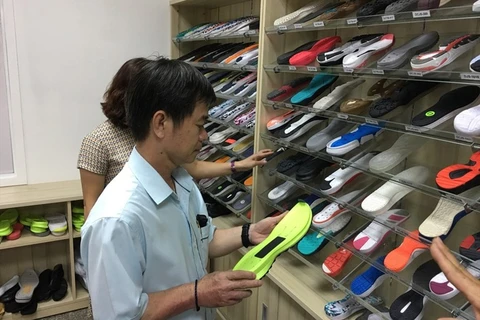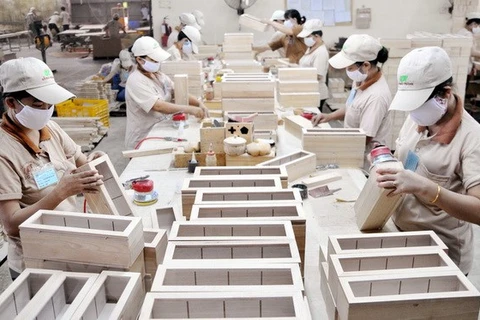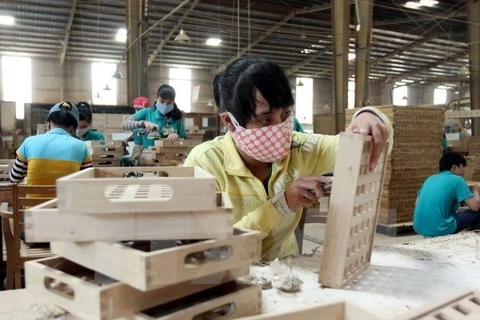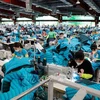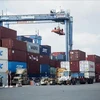 The leather and footwear sector continued to record a double-digit growth rate in the first quarter (Photo: VietnamPlus)
The leather and footwear sector continued to record a double-digit growth rate in the first quarter (Photo: VietnamPlus) Hanoi (VNA) - As leather – footwear is an export-oriented industry, vagaries in such markets as the US and the EU will have considerable impact on the purchasing power and export of these products.
Phan Thi Thanh Xuan, Vice Chairwoman of the Vietnam Leather, Footwear and Handbag Association (LEFASO), said although there was a long Lunar New Year (Tet) holiday in February, the leather and footwear sector still posted a double-digit growth rate in the first quarter of 2019.
Statistics show that 62.9 million pairs of leather footwear were produced in the first three months of this year, up 11.7 percent year on year. Meanwhile, the export of footwear of all kinds brought home some 3.97 billion USD, up 15.3 percent.
Xuan gave an interview to VietnamPlus about the sector’s production and business activities in Q1 and forecast for the months to come.
[Vietnam exports a billion pairs of shoes each year]
- What are the highlights of Vietnam’s leather and footwear sector in Q1?
Mrs. Phan Thi Thanh Xuan: Data show that the sector’s growth rate in January was still high, especially footwear – 12 percent.
However, the Tet holiday in February led to an export decline, but the expansion was still higher than the same period last year. Therefore, the leather and footwear industry still met the target for Q1 with a growth rate of over 10 percent.
- Recently, some organisations predicted a growth recession in the global economy. How has the leather and footwear sector prepared to cope with such a scenario, especially amidst the Brexit?
Mrs. Phan Thi Thanh Xuan: Leather – footwear is an export-oriented industry. Therefore, vagaries in such markets as the US and the EU will greatly influence the purchasing power and export of these Vietnamese products.
Facing such moves, clients usually suspend to keep a watch on the situation as well as changes in the market, which will have considerable impact on manufacturing activities.
To deal with such a context, at first, the association always updates businesses on the development of the global footwear industry because if they build their business strategies without knowledge of the development trend around the world and vagaries in large markets, they could suffer losses.
This was seen clearly when the UK decided to withdraw from the EU. When information about the Brexit was reported, clients almost suspended and exports to the UK dropped by half.
In the face of those developments, providing information for businesses is the first thing the association must do. More importantly, to steer clear of passivity, it is necessary to form close relations with clients as clients always have the best grasp of information about the market and make response in the fastest way.
Hence, future orders will depend much on economic changes. At present, the signing of orders for the spring – summer seasons has been almost completed, and firms will have to wait for some more time to receive orders for the autumn – winter seasons from clients.
- The Comprehensive and Progressive Agreement for Trans-Pacific Partnership (CPTPP) has been signed. How will this deal affect the sector?
Mrs. Phan Thi Thanh Xuan: According to what we have learnt, the enforcement of the CPTPP has attracted attention from many enterprises.
In particular, they expect good growth in shipments to Canada and Mexico because Vietnam hasn’t had any free trade agreements with these markets.
Besides, the association believes that clients from these markets are also interested in footwear and handbag products of Vietnam. Therefore, these will be favourable conditions for us to boost trade with other countries.
- What should businesses prepare to raise their market shares in these markets?
Mrs. Phan Thi Thanh Xuan: For domestic firms, firstly, they must have a good grasp of information since Vietnam is already a CPTPP member, and enterprises have to comply with many requirements like technical standards.
For the firms that are familiar with export, they are able to satisfy those requirements. However, for those whose production mainly serves the domestic market, when expanding their market shares, they need to have a thorough grasp of information and then strictly adhere to all regulations of their markets so as to successfully export their products.
Therefore, I think that businesses need to concurrently improve their grasp of information and receive training because without training, it would be very difficult for them to carry out even small things, like how to fill in application forms correctly to receive preferential treatment or how to have right certificates of origin, to meet requirements set in orders.
That process is very complicated and difficult for companies that have never handled export – import procedures before.
- What has the association planned to assist businesses?
Mrs. Phan Thi Thanh Xuan: The association will step up the provision of information and training and coordinate with specialised agencies to organise training courses for businesses.
Additionally, we will also collect their opinions to submit them to the Ministry of Industry and Trade so as to remove difficulties in a timely manner, while standing side by side with firms to have a better grasp of the market.
- Thank you very much./.


